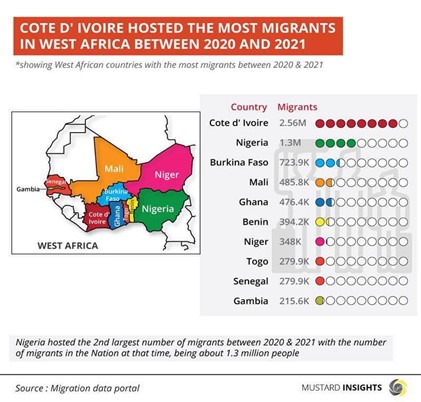Migration in Africa remain a rising occurrence, as various African countries record higher numbers of its citizens leaving for greener pastures yearly, one could only imagine how much talent has been lost, and to what degree this could affect these countries in the long term.

Migration in Africa continues to become a rising occurrence, as various African countries record higher numbers of its citizens leaving for greener pastures yearly, one could only imagine how much talent has been lost, and to what degree this could affect these countries in the long term. Migration essentially entails the movement of people from one place to another with intentions of settling, permanently or temporarily, at a new geographical location. However, the UN Migration Agency (IOM) defines a migrant as “any person who is moving or has moved across an international border or within a State away from his/her habitual place of residence, regardless of (1) the person’s legal status; (2) whether the movement is voluntary or involuntary; (3) what the causes for the movement are; or (4) what the length of the stay is”.
There are a number of reasons why people leave the environments they are resident in, in search of another. These reasons are called “push” and “pull” factors. “Push factors include leaving a place because of a problem, such as a food shortage, war, or flood, while the pull factors include moving to a place because of something good, such as a nicer climate, more job opportunities, or better food supplies.” (National Geographic)
The United Nations (2017) revealed that the number of international migrants worldwide had increased steadily between 2000 and 2017. Indeed, the number of international migrants had risen from 173 million in 2000, to 220 million in 2010, and about 258 million in 2017. The UN report also revealed that the amount if migrants in Africa were 14.7 million. However, in 2020 an estimated 7.6 million international migrants resided in Sub-Saharan Africa as of mid-year 2020, almost 34 per cent (2.6 million) lived in Côte d’Ivoire and 17 per cent (1.3 million) in Nigeria (UN DESA, 2020).
Cote D'Ivoire Hosts the Most Migrants in West Africa
Historically, Cote d'Ivoire has been the country of destination of migration movements in West Africa and became an International Organization for Migration (IOM) Member State in June 2000 to assist the government and various stakeholders in managing migration flows as well as promote the wellbeing and dignity of migrants in and outside the country (IOM). It covers an area of 322,463 km² and has a population of 27,053,629 (Worldbank) .
Between 2020 and 2021, Cote d'Ivoire hosted a number of 2.5 million migrants and this number is largly underestimated as high levels of migrations are not fully captured by existing data. Majiority of migrants coming into Cote d’Ivoire are people from Burkina Faso. According to the Migration Data Portal, a total of 1.37 million people emigrated to Cote d’Ivoire from Burkina Faso, while a number of 562.11 thousand people left Cote d’Ivoire for Burkina Faso. Additionally 522.14 thousand Malians also made a move from their country to Burkina Faso. These foreigners mainly reside in rural regions such as, Sud-Comoé, Bas-Sassandra, Moyen-Cavally, Moyen-Comocé, and Haut-Sassandra in Cote d’Ivoire.
The main reason why people are leaving Burkina Faso is because Cote d'Ivoire is the country with a higher level of development than Burkina Faso, with as many more opportunities. Afrobarometer found that economic considerations (including “finding work”, “economic hardship”, “poverty” and “better business prospects”) were cited as the most important reason for considering emigration by between 70 and 90 per cent of respondents in all 14 Western African countries surveyed. As well as pursuing an education, joining family members abroad and adventure were other commonly cited reasons, but did not account for more than 25 per cent of responses in any country (Afrobarometer, 2019).

Other Key West African Countries
Nigeria is documented as the second country with the most migrants. It recorded a number of 1.3 million migrants, a bulk of which emigrated from Benin and Ghana, with a number of 377.16 and 238.28 thousand respectively
Burkina Faso recorded 723.9 thousand, Mali recorded a number of 485.8 thousand, Ghana recorded 476.4 thousand migrants, Benin recorded 394.2 thousand migrants, Niger recorded 348 thousand migrants, Togo and Senegal both recorded a number of 279.9 thousand migrants, while Gambia recorded the least with 215.6 thousand migrants.
Thoughts?
We won't share your email address. All fields are required.
